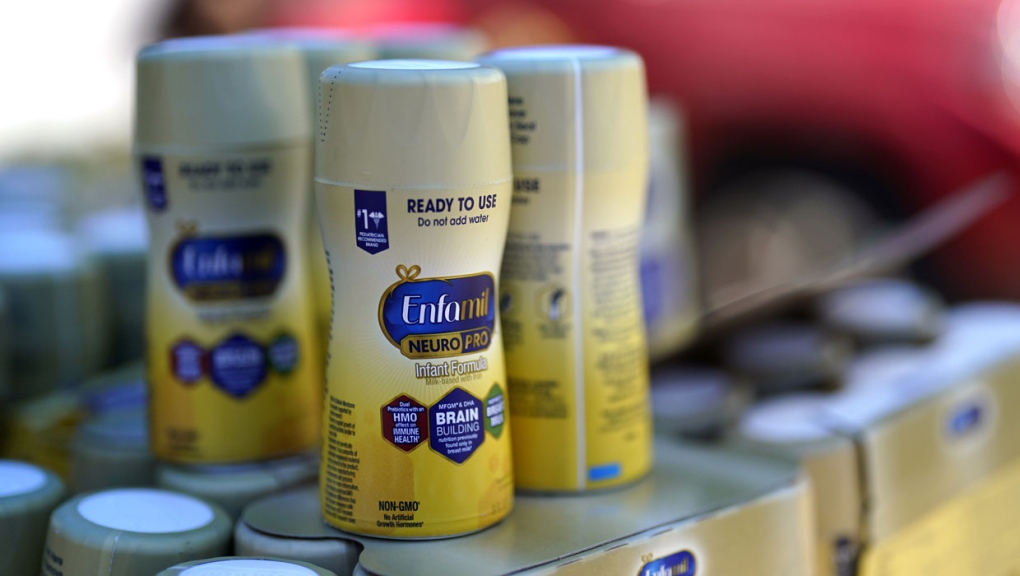Study from U of C suggests 'unscientific claims' are being made by baby formula producers
 An international study, which included research conducted at the University of Calgary, found many of the claims on labels of baby formula have little, if any, scientific evidence to support them. (AP Photo/David J. Phillip)
An international study, which included research conducted at the University of Calgary, found many of the claims on labels of baby formula have little, if any, scientific evidence to support them. (AP Photo/David J. Phillip)
An international study, which includes support from the University of Calgary, suggests baby formula companies are "highly likely" to make unscientific claims about their products.
The research, published in the British Medical Journal on Wednesday, looked at the lack of scientific evidence to back up the claims made on the labels of baby formula products.
The Canadian segment of the research was conducted by Dr. Meredith Brockway, internationally-certified lactation consultant and assistant professor with the University of Calgary's Faculty of Nursing.
Brockway says while formula provides "adequate" nutrition for babies, it lacks numerous other components that are present in human milk that positively impact infant growth and development.
"We challenge the unscientific claims that formula companies are making regarding their additives," she said in a release.
"In the 757 infant formula products identified, 608 linked to an average of two claims (ranging from one in Australia to four in the U.S.) and 31 types of claims across all products."
Of those claims, Brockway says scientific evidence was absent in 74 per cent of them.
When companies did provide data, more than half cited clinical trials, but just 14 per cent of those were registered and 90 per cent "contained a high risk of bias."
"This means that the evidence used to support these claims is really of quite low quality," Brockway said.
Brockway is advising parents to be aware when an infant formula product states it has additives to improve certain aspects of infant health, saying it's "highly likely" this is not supported by high quality scientific evidence and not worth the added cost.
She adds the claims can also overstate the perceived benefits of formula over breastfeeding and possibly undermine the practice among Canadian mothers.
 In this July 19, 2011, file photo, Similac baby formula is displayed on the shelves at Shaker's IGA in Olmsted Falls, Ohio. (AP Photo/Mark Duncan)
In this July 19, 2011, file photo, Similac baby formula is displayed on the shelves at Shaker's IGA in Olmsted Falls, Ohio. (AP Photo/Mark Duncan)
While the research is based on observational findings and is limited, Brockway says any claims made on baby formula labels can be considered "controversial."
"We are hoping our results – which support revised regulatory frameworks for breast milk substitutes to better protect consumers – will generate lots of important discussion about the continued unethical marketing by formula companies."
CTVNews.ca Top Stories

LIVE UPDATES Luigi Mangione arrested as 'strong person of interest' in killing of UnitedHealth CEO Brian Thompson
New York authorities have identified Luigi Mangione as the 'strong person of interest' in connection with the killing of UnitedHealth executive Brian Thompson. Follow along for live updates from CTVNews.ca.
Wait times grow as backlogs and frustration build amid Canada Post strike
Wait times for deliveries continue to grow as shoppers and businesses deal with the fallout from the Canada Post strike.
Family spokesman says slain Edmonton security guard had only been working 3 days
A spokesman for the family of a security guard who police say was murdered while patrolling an Edmonton apartment building last week says the man had only been on the job for three days.
Sask. hockey player recovering after near fatal skate accident during game
The Sask East Hockey League (SEHL) has released details of a near fatal accident at one of its games over the weekend – which saw a Churchbridge Imperials player suffer serious injuries after being struck with a skate.
Gang leader in Haiti accused of massacring older people to avenge son's death
A gang leader who controls a key port in Haiti's capital is accused of massacring older people and Vodou religious leaders in his community to avenge his son's death, according to the government and human rights organizations that estimate more than 100 killed.
GST break could cost Ottawa $2.7B if provinces don't waive compensation: PBO
The federal government's GST holiday would cost as much as $2.7 billion if provinces with a harmonized sales tax asked for compensation, the parliamentary budget officer said on Monday.
Canadian government to table fall economic statement next Monday
Finance Minister Chrystia Freeland is set to table the federal government’s fall economic statement next Monday, the government announced today.
Hazardous conditions expected in some parts of Canada with weather warnings in effect
Hazardous conditions are expected in some parts of Canada this week.
BREAKING Suspect in killing of UnitedHealth executive Brian Thompson in custody
The man suspected of killing UnitedHealth executive Brian Thompson in a brazen shooting outside a midtown Manhattan hotel last week has been arrested, New York City officials said on Monday.
































